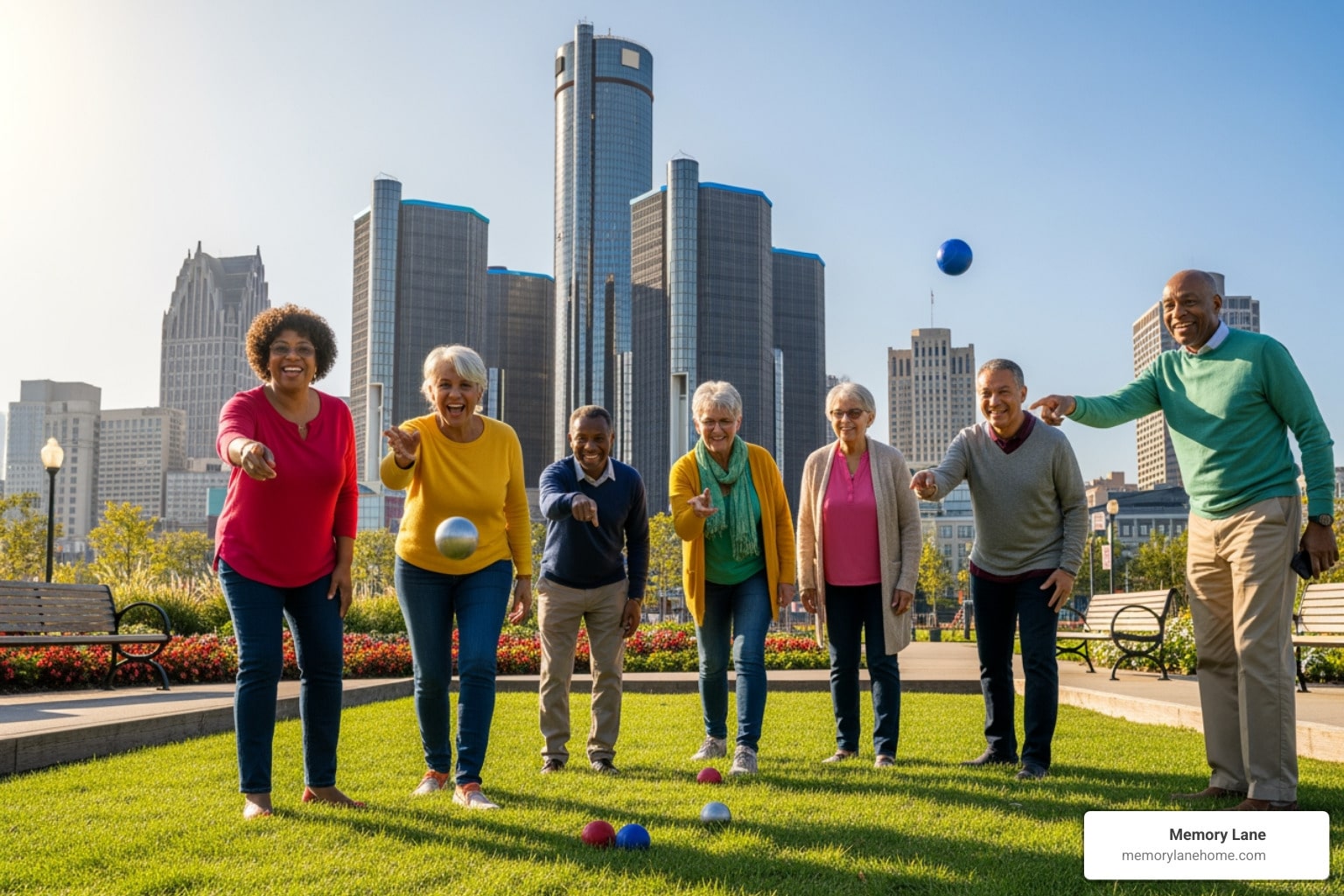Discover the best dementia care facilities Sacramento. Compare options, costs, and support for your loved one. Make an informed choice.

Discover Quality Alzheimer’s Care Services in Ann Arbor
Discover Quality Alzheimer’s Care Services in Ann Arbor

Memory Lane Alzheimer’s Care Services Overview: Compassionate Memory Care in Ann Arbor and Ypsilanti
Providing specialized Alzheimer’s care services in Ann Arbor demands a blend of clinical expertise and a comforting environment. At Memory Lane Assisted Living, our mission is to enhance quality of life for seniors with dementia by replicating the familiarity of home, personalizing every aspect of care, and maintaining transparent communication with families.
This article examines what makes our six-bedroom ranch homes unique, explains how customized care plans address Alzheimer’s, Lewy Body and frontotemporal dementia, walks through a typical day, highlights cost transparency, explores family support resources, and showcases the latest innovations in memory care. By weaving together these themes, we demonstrate why Memory Lane stands out as the trusted partner for families navigating dementia care decisions.
What Makes Memory Lane’s Alzheimer’s and Dementia Care Unique?
Memory Lane’s dementia care model combines a residential ranch house setting with specialized staff training to deliver truly personalized support that enhances residents’ quality of life. This intimate environment contrasts sharply with larger memory care units by emphasizing familiar routines and consistent caregiver relationships, which in turn improve orientation and emotional stability. Building on this foundation, each subsequent section delves into key elements—environment, staffing ratio, and caregiver expertise—that underpin our unique approach.
How Does a Home-Like Environment Benefit Seniors with Dementia?
A home-like environment replicates familiar living conditions to reduce anxiety, reinforce orientation, and preserve daily routines. Comfortable furnishings, personalized décor, and communal living spaces create a sense of continuity that supports memory retention and emotional well-being.
Below is a breakdown of key environmental features and their direct benefits:
These nurturing features foster security and prepare residents for individualized care routines focused on their remaining strengths.
Why Is a High Caregiver-to-Resident Ratio Important for Memory Care?
A high caregiver-to-resident ratio ensures consistent supervision and rapid response to changing needs, which directly enhances safety and supports personalized interactions. Reduced caseloads allow caregivers to develop deeper relationships, notice subtle health changes, and adapt activities in real time.
Key advantages of our staffing model include:
- Enhanced monitoring that quickly detects behavioral or medical shifts.
- Flexible scheduling to align activities with individual circadian patterns.
- Increased opportunities for one-on-one engagement during personal care tasks.
These focused interactions build trust and continuity of care, laying the groundwork for customized plans that evolve with each resident’s condition.
What Specialized Training Do Memory Lane Caregivers Receive?
Caregivers at Memory Lane complete dementia care certification programs that cover Alzheimer’s, Lewy Body, and frontotemporal dementia, improving clinical judgment and empathetic communication. Training modules emphasize behavior management, communication strategies, and adaptive activity planning to support cognitive and emotional needs.
This robust training framework ensures that caregivers possess both the technical know-how and compassionate approach necessary to implement personalized care plans effectively.
How Are Personalized Care Plans Tailored for Different Dementia Types?
Personalized care plans combine medical knowledge with resident preferences to deliver targeted interventions that address cognitive, emotional, and physical needs across dementia stages. Each plan is developed through a thorough assessment of history, abilities, and family input, then adjusted continuously based on observed responses. In the following subsections, we explore plan features specific to Alzheimer’s, approaches for Lewy Body and frontotemporal dementia, and integration of cognitive and physical therapies.
What Are the Key Features of Care Plans for Alzheimer’s Disease?
Alzheimer’s care plans focus on memory support, behavioral management, and gradual adaptation of activities to maintain function and emotional stability. Core components include:
- Stage-based cognitive exercises that reinforce recall and orientation.
- Life story work using photos and music to evoke positive memories.
- Environmental cues such as labeled storage and calendar boards to promote independence.
By aligning activities with each stage of Alzheimer’s progression, these features slow functional decline and reinforce a sense of purpose and routine.
How Does Memory Lane Support Residents with Lewy Body and Frontotemporal Dementia?
Lewy Body and frontotemporal dementia demand specialized approaches to manage fluctuating cognition and behavioral changes through customized activity pacing and communication strategies. Care plans include:
- Flexible scheduling that accommodates variable alertness and motor symptoms.
- Behavioral protocols emphasizing calming techniques and sensory modulation.
- Communication guidelines that adapt language and pacing to individual processing abilities.
These tailored measures address the unique clinical and emotional challenges posed by each dementia subtype, fostering engagement while minimizing agitation.
How Are Cognitive and Physical Needs Addressed in Daily Care?
Daily care routines integrate cognitive stimulation and physical engagement to reinforce neural pathways and preserve mobility simultaneously. Planned interventions include:
- Group sessions featuring memory games, art therapy, and music to stimulate multiple brain regions.
- Gentle exercise routines, such as chair yoga and guided walks, to support strength and balance.
- Sensory activities like gardening or pet therapy to connect physical movement with emotional satisfaction.
This holistic strategy reinforces mind-body integration, enhancing overall well-being and sustaining functional abilities over time.
What Does a Typical Day Look Like at Memory Lane’s Memory Care Homes?
A structured day blends purposeful activities, social interactions, and restful moments to optimize cognitive engagement and emotional comfort. Consistent routines promote orientation, while variety prevents monotony and supports mood regulation. The following sections highlight key components of daily life.
Which Activities Promote Cognitive Engagement and Social Connection?
Cognitive engagement is promoted through group art, music therapy, and memory games that reinforce neural connectivity while fostering social bonds. Typical offerings include:
- Guided art projects using familiar themes to stimulate recall.
- Interactive music sessions that combine singing, rhythm instruments, and reminiscence.
- Themed trivia and word puzzles designed to leverage personal histories.
These collective activities strengthen community ties and build confidence, paving the way for more individualized therapeutic options.
How Is Safety and Comfort Ensured for Residents with Dementia?
Safety measures include secured entry systems, motion monitoring, and supportive furnishings to minimize risk and maximize independence within comfort zones.
These safeguards maintain a balance between freedom and security, ensuring residents can move confidently while families rest assured.
How Transparent Is Memory Lane’s Pricing Compared to Other Ann Arbor Memory Care Facilities?
Transparent pricing clarifies monthly fees and included services to enhance financial planning and avoid surprises. By comparing local averages with our all-inclusive model, families gain clear insight into value and cost structures.
What Does All-Inclusive Pricing Cover at Memory Lane?
All-inclusive pricing at Memory Lane covers room, meals, personalized care services, activities, and ongoing medical oversight to provide predictable expenses. Coverage details include:
- Private accommodations and household utilities.
- Three chef-prepared meals plus snacks tailored to dietary needs.
- 24/7 personalized memory care services and medication management.
- Daily activity programs and transportation for off-site appointments.
This comprehensive model eliminates hidden fees, ensuring families can focus on quality of life rather than budget uncertainties.
How Does Memory Lane’s Pricing Compare to Average Memory Care Costs in Ann Arbor?
While average memory care costs in Ann Arbor range from $6,273 to $8,900 per month, Memory Lane’s all-inclusive model offers comparable value without additional fees.
Families receive a clear single invoice covering all essential services, simplifying financial management and reducing stress.
What Financial Resources and Guidance Are Available for Families?
Financial guidance services help families explore veteran benefits, long-term care insurance options, and potential tax deductions to optimize care planning. Memory Lane’s advisors offer personalized consultations to review eligibility criteria, assist with benefit applications, and recommend community-based funding programs. This support framework empowers families to secure maximum resources while ensuring their loved ones access the best possible care.
How Does Memory Lane Support Families Through the Dementia Care Journey?
Family support programs offer education, peer networks, and decision-making assistance to navigate the emotional and logistical challenges of dementia care. By blending expert guidance with community connections, Memory Lane ensures caregivers feel informed, equipped, and supported at every stage.
What Resources and Support Groups Are Offered for Caregivers and Families?
Memory Lane facilitates caregiver support groups, educational workshops, and curated resource materials to reinforce coping strategies and foster community. Monthly sessions cover topics such as behavior management techniques, self-care practices for caregivers, and legal planning basics. Supplemental guides provide local referrals for counseling, respite services, and advocacy organizations. These resources strengthen family resilience and create a shared understanding among participants.
How Can Families Choose the Right Memory Care Facility in Ann Arbor?
Choosing a facility involves assessing staff expertise, environment, care philosophy, and transparency to match each family’s unique priorities. Key decision factors include:
- Staff training and caregiver-to-resident ratio for personalized attention.
- Physical setting and security features that support comfort and safety.
- Program offerings, such as therapy options and social activities.
Evaluating these criteria side by side enables families to select a memory care partner that aligns with their loved one’s needs and values.
Why Choose Memory Lane Assisted Living Over Other Alzheimer’s Facilities in Ann Arbor?
Memory Lane’s intimate six-bedroom homes, high staff ratio, and specialized expertise differentiate it from larger memory care settings. Our person-centered philosophy, combined with transparent communication and family involvement, positions us as a leader in compassionate care.
What Do Families Say About Their Experience at Memory Lane?
Families report enhanced well-being and peace of mind due to attentive care, personalized activities, and genuine connections. Debra B. shared that after nearly a year at Memory Lane, her mother thrives in a supportive environment where staff celebrate every small achievement.
“With only six residents in each home, the caregiver-to-resident ratio is so much better than in larger corporate memory care facilities,” highlighted the consistent one-on-one attention that fosters real bonds.
These testimonials underscore our commitment to dignity, respect, and individualized support for every resident.
How Can You Schedule a Personal Tour or Consultation?
To schedule a personal tour or consultation, families can contact Memory Lane’s care advisors to arrange an in-person visit that addresses all questions and preferences. During these visits, prospects experience the home-like setting firsthand, meet our trained staff, and review customized care plan options. This guided introduction ensures that each family gains a clear understanding of how Memory Lane’s model aligns with their loved one’s needs.
What Are the Latest Trends and Innovations in Memory Care at Memory Lane?
Recent innovations in memory care combine technology, person-centered models, and evidence-based therapies to enhance safety and engagement. By integrating modern tools with time-tested care philosophies, Memory Lane stays at the forefront of memory services, focusing on outcomes that matter most to residents and families.
How Is Technology Used to Enhance Safety and Care Coordination?
Memory Lane uses motion monitors and electronic care records to track resident activity and coordinate interdisciplinary interventions swiftly. Real-time alerts notify caregivers of potential falls or unusual patterns, while digital documentation ensures seamless information flow among nursing, therapy, and family teams. This integrated system improves response times and supports data-driven adjustments to personalized care plans.
What Is the Importance of Person-Centered Care in Dementia Services?
Person-centered care honors individual preferences, life history, and personal routines to maintain dignity, autonomy, and meaningful engagement. By tailoring everything from daily menus to leisure activities based on resident interests, this approach fosters emotional connection and sustains identity. Person-centered care not only improves quality of life but also aligns with best practices endorsed by leading dementia care associations.
Memory Lane’s dedication to these principles ensures that every aspect of our program is rooted in respect for each resident’s story.
Memory Lane Assisted Living redefines memory care through home-like settings, expert training, and transparent practices. Each personalized care plan addresses specific dementia types, blending cognitive and physical therapies to preserve function and dignity. Families benefit from clear pricing, ongoing support resources, and a collaborative process that values their input. Discover a memory care partner committed to compassionate excellence by arranging a personal visit today.
Frequently Asked Questions
What types of dementia can Memory Lane accommodate?
Memory Lane specializes in care for various types of dementia, including Alzheimer’s disease, Lewy Body dementia, and frontotemporal dementia. Each type presents unique challenges, and our personalized care plans are designed to address the specific needs associated with these conditions. By tailoring interventions based on the type of dementia, we ensure that residents receive the most effective support to enhance their quality of life and maintain their dignity.
How does Memory Lane involve families in the care process?
Family involvement is a cornerstone of Memory Lane’s approach to care. We encourage open communication and regular updates about residents’ progress and well-being. Families are invited to participate in care planning meetings, where they can share insights about their loved ones’ preferences and history. This collaborative approach not only strengthens the care provided but also helps families feel more connected and informed throughout the dementia care journey.
What safety measures are in place for residents at Memory Lane?
Memory Lane prioritizes the safety of its residents through various measures, including secured entry systems, motion sensors, and supportive furnishings designed to minimize risks. Our homes are equipped with features like rounded furniture edges and stable support bars to enhance mobility. Additionally, outdoor areas are gated to provide safe access to fresh air. These precautions ensure that residents can enjoy their environment while maintaining their independence and security.
Are there any recreational activities available for residents?
Yes, Memory Lane offers a variety of recreational activities designed to promote cognitive engagement and social interaction. Activities include art and music therapy, memory games, and themed trivia sessions that leverage residents’ personal histories. These programs not only stimulate cognitive function but also foster a sense of community among residents, enhancing their overall well-being and quality of life.
How does Memory Lane support caregivers and families emotionally?
Memory Lane provides emotional support for caregivers and families through various programs, including support groups and educational workshops. These resources help caregivers develop coping strategies, share experiences, and connect with others facing similar challenges. By fostering a supportive community, we aim to alleviate the emotional burden of caregiving and empower families with the knowledge and tools they need to navigate the complexities of dementia care.
What is the process for creating a personalized care plan?
The creation of a personalized care plan at Memory Lane begins with a comprehensive assessment of the resident’s medical history, preferences, and abilities. This assessment involves input from family members to ensure that the plan reflects the individual’s unique needs. Care plans are continuously monitored and adjusted based on the resident’s responses and changing conditions, ensuring that care remains relevant and effective throughout their journey.
How can families access financial guidance for memory care services?
Memory Lane offers financial guidance services to assist families in exploring various funding options, including veteran benefits, long-term care insurance, and potential tax deductions. Our advisors provide personalized consultations to help families understand eligibility criteria and navigate the application process. This support empowers families to maximize their resources and make informed decisions regarding their loved ones’ care.
Conclusion
Memory Lane Assisted Living transforms the memory care experience through personalized plans, expert staff, and a nurturing environment that prioritizes dignity and comfort. Families gain peace of mind with transparent pricing and ongoing support, ensuring their loved ones receive the best possible care. By choosing Memory Lane, you are investing in a compassionate partnership that values both residents and their families. Schedule a personal visit today to see how we can support your loved one’s journey.


